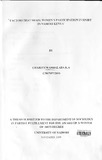| dc.description.abstract | Sport is a social reality, drawing from other social spheres accused of bias against
women, the study sought to discover if the problem of gender bias exists in sport in
Nairobi and if it was problematic. The main argument of the study is that socio-cultural
factors affect women's choice to engage in sport as well as determine their performance
in it. Objectives of the study were: a) To explore the factors that made women engage in
sport, b) To discover whether bias exists in sport and how it impacts on performance and
c) To find out whether being in sport has affected their attitudes on femininity. This study
covered women athletes in 5 team sport disciplines in Nairobi.
A survey research was carried out to achieve the goals of the study. The research site was sport fields in Nairobi. Quota sampling was used to cover a total of 150 athletes and 9
key informants from Basketball, Netball, Volleyball, Hockey and Handball. The self administered questionnaires were the primary tools of data collection, while informal
interviews were administered to the key informants within the sport institution. The raw
data were processed using the SPSS statistical package; both descriptive and inferential
statistics were used to analyze the data.
Findings from the study revealed that women sport in Nairobi is dominated by young
females. Younger females are more likely to participate in newer, more aggressive, direct
contact sport while older women are likely to engage in gentler indirect contact sport.
Overwhelming majority of women athletes covered (76%) were single by the time of the
survey. It is either that once married women in non traditional sport quit, or those who
marry and remain in sport are in particular kinds of sport. Most women are literate and
relatively well educated. Most of them engage in sport for the love of it and the challenge
it poses in search of objective new identities different from the one women have been
socialized to accept. There exists discrimination against women athletes in Nairobi in
comparison to male athletes at the sports governing body and this negatively contributes
to poor performance. Indeed engaging in sport for many women has changed their
perception on femininity. In the bivariate analysis; marital status, education levels and
employment status were significant at the. 05 probability level when cross tabulated with
participation in sport.
Following such findings the study concluded that sociocultural factors do determine
women's engagement in sport and therefore recommends that women as the athletes need to be more proactive and need to realize that they have a major role to play to champion their cause in sport. The study advocates for change at both institutional and national levels to tackle the problem of bias. And finally the study appeals to the research
community to go deeper to our history and gather information on the games which people
culturally identify with and repackage it, market it to be an international event. | en |

